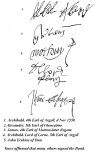|
The First Covenant.
Ane Godlie Band For the
maintenance of the Evangel maid be ye Erle of Argill and
uyer Noble men. Subscribed at Edinburgh 3 December 1557. Cited
Johnston`s Treasury p24-5 . Hewisons
Covenanters, vol i , p11-12 Works of Knox vol
6 p 674.
“We, perceiving how Satan in
his members, the Antichrist of our time, cruelly does
rage, seeking to overthrow and destroy the gospel of
Christ and His congregation, ought, according to our
bounden duty, to strive in our master`s cause, even unto
the death, being certain of the victory in Him; the which,
our duty being well considered, we do promise before the
majesty of God and His congregation, that we, by his
Grace, shall with all diligence continually apply all our
power, substance and our very lives, to maintain, set
forward, and establish the most blessed Word of God
and His congregation, and shall labour according to our
powers, to have faithful ministers, truly and purely to
minister Christ`s sacraments to His people. We shall
maintain them, nourish them, and defend them, the whole
congregation of Christ, and every member thereof according
to our whole powers, and waging of our lives, against
Satan, and all wicked power that doth intend tyranny or
trouble against the aforesaid congregation. Unto which the
Holy Word and congregation we do join us; and so do
forsake and renounce the congregation of Satan with all
the superstitious abominations and idolatry thereof. And,
moreover, shall declare ourselves manifest enemies
thereto, by this our faithful promise before God,
testified to this congregation by our subscription at
these presents. “
Subscribed by : A. Erle
of Ergyl.
Glencarn.
Mortoun.
A. Lord of Lorne.
Johnne Erskyne of Doun.

Attached to the Band were two
resolutions in which it was resolved to insist on the use
of King Edward`s Prayer Book in parishes under their
control and to promote the reading of the Scriptures
privately in houses until the authorities permitted
public preaching by true and faithful ministers. These
resolutions were important not least because they
encouraged the public at large to express their dislike of
the ceremonies of the Roman Catholic Church.
|